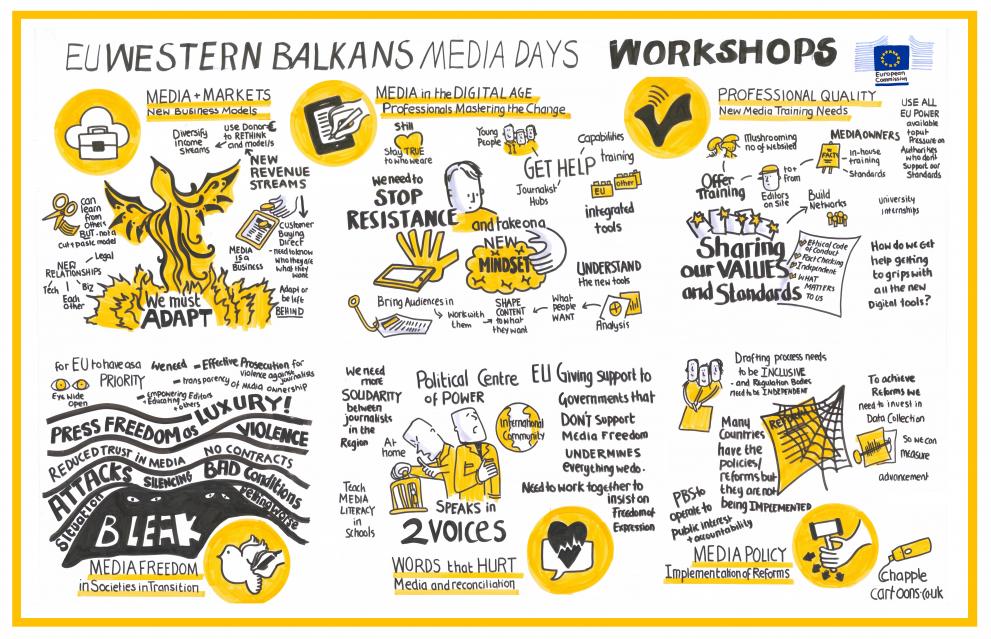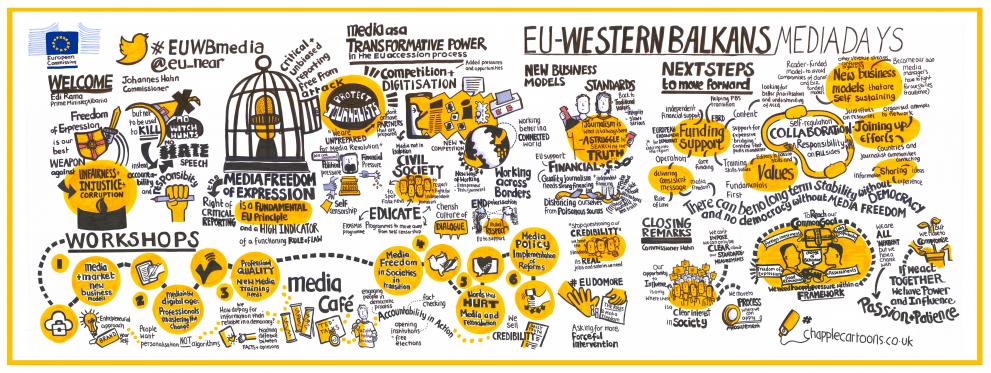
Freedom of expression is a key indicator of a country's readiness to become part of the EU. It implies a commitment to democracy, good governance and political accountability. No country can join the EU without guaranteeing freedom of expression as a basic human right (Article 49 of the Lisbon Treaty)
A complex challenge
Ensuring freedom of expression and of the media is one of the main challenges facing enlargement countries. Political interference in the media, economic concerns such as media concentration and various forms of harassment, including violence against journalists, are topical issues in societies of the Western Balkans and Turkey. Improving this situation inevitably goes beyond a simple transposition of EU rules: it calls for behavioural and cultural change in politics, judiciary and media.
The EU supports this process by
- providing legal assistance and guidance in drafting media legislation
- thoroughly monitoring the policies of candidate countries and potential candidates in this field
- providing financial support through IPA programmes
Guidelines for EU support to media freedom and media integrity
The Guidelines build on the policy vision as set out in the Conclusions of the Speak-up!2 conference and the EU Enlargement Strategy 2013-2014. The document translates the political objectives into a tangible "Results Framework" which identifies the outcomes to be achieved as well as the indicators to monitor them.
The Guidelines, which have been largely consulted with relevant groups, aim to provide consistency between policy support and assistance at both multi-country and national level.
To this end, three main groups need to be mobilised and targeted by support:
- state institutions in charge of setting up an enabling environment for free expression in media
- media professional organisations which are key drivers of awaited change
- individual media outlets expected to improve their internal governance and performance.
In 2017, the EU funded project Technical Assistance for Civil Society Organisations (TACSO), in coordination with other stakeholders, established a monitoring system to draw up a systematic, comprehensive and efficient assessment of the situation in the candidates countries and potential candidates by applying the same methodology and approach across the region. The 2017 monitoring report (cf. also the PowerPoint presentation) offers a brief overview of common issues in the region, as well findings from the general population survey conducted in Albania, Bosnia and Herzegovina, Kosovo, North Macedonia, Montenegro and Serbia regarding selected aspects of the Results Framework.
EU financial support
EU financial support for freedom of the media is granted through the Instrument for Pre-accession Assistance (IPA). The most recent EU funded initiatives include:
- Network of journalist associations – building the capacity of journalist professional organisations and a regional early warning platform reporting cases of attacks against journalists
- Building Trust in Media - a project reinforcing media accountability mechanisms – supporting press councils and ethical journalism, increasing media governance through ethical audits and good governance seminars, strengthening media and information literacy through training and awareness raising campaigns.
- Reinforcing Judicial Expertise - support to the judiciary in applying the case law of the European Court of Human Rights in the field of freedom of expression and training on ethical rules to the media regulatory authorities and media outlets.
- EU award scheme for investigative journalism – prizes for the best investigative stories covering a wide range of topics from the misuse of power to social injustice.
EU - Western Balkans Media Conferences
Launched in 2017 by the European Commission, the EU – Western Balkans Media Days aimed to ensure that media freedom remains a priority while tackling the complexity of pressing political, economic and social issues the region experience at present. Moreover, the forum has reached out to the professional challenges of journalists and media: their need to adapt to a rapidly changing media environment. The conference aimed at having result-oriented discussions that could afterwards be reflected in adjusted assistance approaches to media related issues within the European enlargement policy.
The 2022 edition of the EU-Western Balkans Media Conference, organised in collaboration with the External Action Service, intends to focus on: the key challenges related to media freedom; protection of journalists and issues related to contamination of the information environment, including information manipulation; foreign interference and disinformation, especially important in the context of Russia’s aggression against Ukraine.
EU-Western Balkans Media Conference 2022 – useful documents and links
- Video trailer
- Press release
- Web release – announcement of the conference
- EU Enlargement Package 2018: freedom of expression - information society and media
- Factograph – EU support to Media in the Western Balkans
- Opening speech by Commissioner Johannes Hahn
- Closing speech by Commissioner Johannes Hahn
- Video gallery
- Photo gallery
- Graphic report: event flow
- Graphic report: Workshop - Professionalisation through education and training
- Graphic report: Workshop - Business sustainability of independent journalism through smart media investment
- Graphic report: Workshop - Regional cooperation of independent media and public broadcasters in the region
- Workshops Recommendations
The EU-Western Balkans Media Days took place in Tirana, Albania, on 9-10 November 2017 gathering over 250 representatives of media outlets and media-organisations, as well as policymakers from the EU and the Western Balkans, to discuss about freedom of expression, economic sustainability of the media sector, and the role of media in the accession process. Two panels and six workshops provided a platform for media professionalism to exchange views and share best practices. The conference paved the way for new forward-looking initiatives to foster independent, sustainable and professional media in the region.
- Recommendations from workshops
- Conference brochure
- Video trailer
- Web announcement
- Press release
- Factograph
- EBS video recording: opening speech
- EBS video recording: concluding remarks
- Graphic report: event flow
- Graphic report: workshops
- #EUWBmedia
Graphic report: workshops

Graphic report: event flow

Conference stream
Programme
Conference documents
Programme
Conference documents
» Implementation record of the Speak Up! conclusions (2011)
» Speak Up! 2 - Conference conclusions
Multimedia
» Webcast recordings of the whole conference (+download option)
» Europe by Satellite recordings of Opening, Session 1 + 4, Concluding debate (+ download option)
» Photo album on the DG Enlargement Facebook Page
Background study
» Western Balkans and Turkey Media and Freedom of Expression Fact-finding and Scoping Study
Programme & Participants
» Speak Up! Conference programme
Conclusions & Recommendations by The Chair
» Speak Up! Conference Conclusions and Recommendations by the Chair
Presentations & Speeches
» Speech: Opening speech by Professor Jerzy Buzek, President of the European Parliament
» Speech: I’ve spoken up and saved my soul. Will I save my life?, by Veran Matic, B 92, Belgrade
Preparatory Contributions
» Media Freedom and its Enemies in the Balkans, by the Balkan Investigative Reporting Network
» Freedom of Expression and Media in the Western Balkans and Turkey, by the Council of Europe
» Measures to Improve Press Freedom in Croatia, by the International Press Institute
» Measures to Improve Press Freedom in Turkey, by the International Press Institute
» Speaking Up: Old and New Challenges for Freedom of Expression, by the Open Society Foundations
» Press Freedom in the Western Balkans and Turkey, by the South-East Europe Media Organisation
Speakers' Publications
Useful Links
» IFJ: Set Turkish Journalists Free
» Guide for Investigative Journalists in the Balkans
» 2010 World Press Freedom Index (Reports without Borders)
» The Media Self-Regulation Guidebook (OSCE)
» Guide to the Digital Switchover (OSCE)
» Ethical Journalism Initiative (International Federation of Journalists, IFJ)
